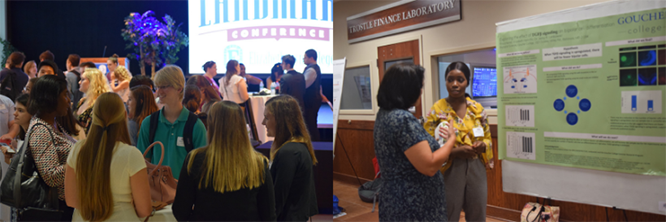Location
Presentations Session 2 - Hoover 214
Department
Biology
Start Date
11-7-2019 2:45 PM
End Date
11-7-2019 3:45 PM
Description
Alternative splicing is the cellular process where gene transcripts (hnRNA) are pieced together in different ways in order to yield unique proteins, each with its own function. Through this process, the approximate 20,000 genes of the human genome can produce the millions of proteins needed for cell survival (Moraes and Goes, 2016). Sam68 is one such protein that directs the process of alternative splicing. Sam68 splices many hnRNA to form the template to create proteins involved in endocytosis, cell morphology, cell cycle regulation and apoptosis (Sanchez-Jimenez and Sanchez-Margalet, 2013). Sam68 has been shown to be upregulated in prostate, breast, and lung cancers, indicating that its function may be related to excessive growth characteristics (Frisone et. al., 2015). We hypothesize that Sam68 causes aggressive growth characteristics via the alternative splicing of SRSF1. Interestingly, SRSF1 is also an alternative splicing protein that targets the hnRNA of genes involved in cell cycle regulation and apoptosis. One transcript spliced by SRSF1 is the BIN1 message, resulting in several known protein (Amphiphysin 1) isoforms, each with related, yet unique functions (Anczukow et. al., 2012). Depending on the isoform of Amphiphysin 2 created, cell growth and apoptosis are altered possibly leading to excessive cell growth and division. This research used human diploid fibroblast cells (HDF) transformed with SV40 T-antigen, a viral oncoprotein that inhibits cellular processes related to apoptosis and induces the cell cycle. Using these cells, we compared the isoforms of SRSF1 and BIN1 present in the T-antigen expressing cells (HDF+T) and wildtype (HDF) cells. Currently, we will create new cell lines by introducing T-antigen encoding plasmid into Sam68 knockout cell lines (HCT116 Sam68-/-) to determine if T-antigen does indeed alter BIN1 isoform choice through a Sam68/SRSF1 pathway. This will enable us to elucidate further, how T-antigen influences cell growth and RNA metabolism.
Recommended Citation
Miller, Sean, "Determining the Role of Sam68 in T-antigen Cellular Expression" (2019). Landmark Conference Summer Research Symposium. 22.
https://jayscholar.etown.edu/landmark/2019/july11/22
Included in
Determining the Role of Sam68 in T-antigen Cellular Expression
Presentations Session 2 - Hoover 214
Alternative splicing is the cellular process where gene transcripts (hnRNA) are pieced together in different ways in order to yield unique proteins, each with its own function. Through this process, the approximate 20,000 genes of the human genome can produce the millions of proteins needed for cell survival (Moraes and Goes, 2016). Sam68 is one such protein that directs the process of alternative splicing. Sam68 splices many hnRNA to form the template to create proteins involved in endocytosis, cell morphology, cell cycle regulation and apoptosis (Sanchez-Jimenez and Sanchez-Margalet, 2013). Sam68 has been shown to be upregulated in prostate, breast, and lung cancers, indicating that its function may be related to excessive growth characteristics (Frisone et. al., 2015). We hypothesize that Sam68 causes aggressive growth characteristics via the alternative splicing of SRSF1. Interestingly, SRSF1 is also an alternative splicing protein that targets the hnRNA of genes involved in cell cycle regulation and apoptosis. One transcript spliced by SRSF1 is the BIN1 message, resulting in several known protein (Amphiphysin 1) isoforms, each with related, yet unique functions (Anczukow et. al., 2012). Depending on the isoform of Amphiphysin 2 created, cell growth and apoptosis are altered possibly leading to excessive cell growth and division. This research used human diploid fibroblast cells (HDF) transformed with SV40 T-antigen, a viral oncoprotein that inhibits cellular processes related to apoptosis and induces the cell cycle. Using these cells, we compared the isoforms of SRSF1 and BIN1 present in the T-antigen expressing cells (HDF+T) and wildtype (HDF) cells. Currently, we will create new cell lines by introducing T-antigen encoding plasmid into Sam68 knockout cell lines (HCT116 Sam68-/-) to determine if T-antigen does indeed alter BIN1 isoform choice through a Sam68/SRSF1 pathway. This will enable us to elucidate further, how T-antigen influences cell growth and RNA metabolism.




Comments
Faculty Mentor: Jane Cavender, Elizabethtown College